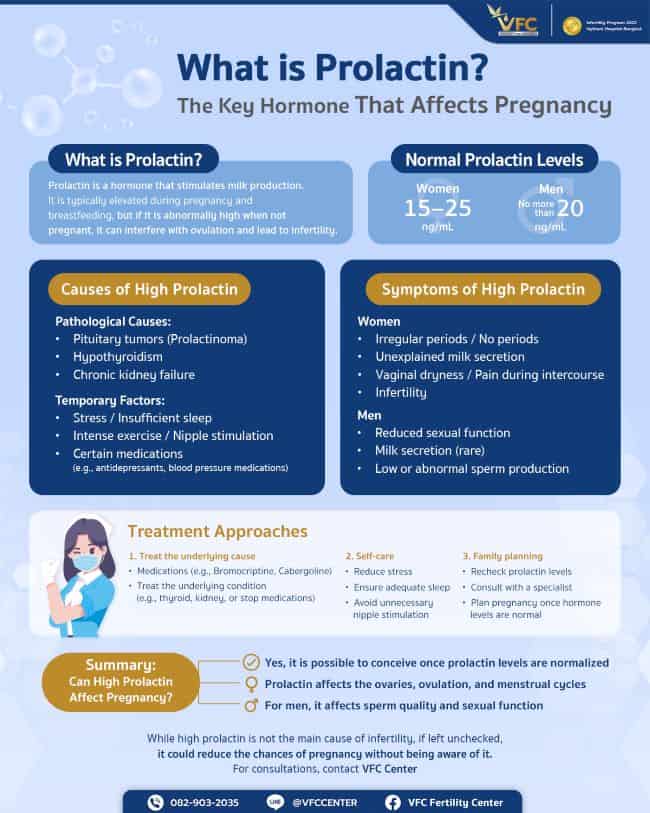
Many couples planning to have children focus on general health care, but one factor that is often overlooked is controlling prolactin levels. This hormone plays a crucial role in the reproductive system. If prolactin levels are higher than normal, it can affect ovulation, making it harder to conceive. While high prolactin is not a common cause of infertility, it is a factor that should not be ignored. Understanding the causes of high prolactin and how to manage it is essential to increasing the chances of a successful pregnancy.

What is Prolactin?
Prolactin is a hormone produced by the anterior pituitary gland. It primarily stimulates the mammary glands to produce milk after childbirth. Prolactin levels naturally rise during pregnancy and breastfeeding. However, if prolactin is elevated when not pregnant, it inhibits the release of FSH (Follicle Stimulating Hormone) and LH (Luteinizing Hormone), which are essential for ovarian function. This can prevent ovulation and affect fertility.
Normal Prolactin Levels
- Women: Approximately 15-25 ng/mL (or no more than 25 mcg/L), with levels fluctuating throughout the menstrual cycle.
- Men: Typically lower than in women, no more than 20 mcg/L.
What Causes High Prolactin?
High prolactin can occur due to various reasons, which can be divided into two main categories:
Pathological Causes
- Pituitary tumors (Prolactinoma), the most common cause of high prolactin
- Thyroid issues, particularly hypothyroidism, are a major cause of high prolactin
- Chronic kidney disease, which reduces the clearance of prolactin from the body
Behavioral or Temporary Causes
- High stress
- Insufficient sleep
- Excessive physical exercise
- Nipple stimulation or breast compression
- Certain medications, such as antidepressants, blood pressure medications, or anti-nausea drugs
What Are the Symptoms of High Prolactin?
Symptoms of high prolactin vary based on gender and hormone levels. It is most commonly seen in women of reproductive age. Common symptoms include:
- Irregular periods, such as missed or lighter periods
- Absence of menstruation
- Unexplained milk secretion from the breasts (Galactorrhea)
- Infertility due to anovulation or irregular ovulation
- Vaginal dryness or discomfort during intercourse
- Reduced libido
Symptoms in Men Include:
- Reduced sexual function
- Decreased libido
- Milk secretion from the nipples (rare in men, as breast tissue is not stimulated by estrogen and progesterone, like in women)
- Abnormal or low sperm count
Can High Prolactin Affect Pregnancy?
The answer is “Yes, it can.” However, pregnancy is still possible once prolactin levels are normalized. This hormone directly affects ovarian function, ovulation, and menstrual cycles. If left untreated, high prolactin can reduce the chances of pregnancy or increase the risk of miscarriage early in the pregnancy.
For men, high prolactin levels can reduce sperm quality and sexual function, which also impacts fertility.

Treatment and Management for High Prolactin
Treatment for high prolactin depends on the underlying cause and can be categorized into several approaches:
1. Treating the Underlying Cause
- Prolactinoma : Use dopamine agonists like Bromocriptine or Cabergoline, which effectively lower prolactin levels and reduce tumor size. If medication is ineffective or the tumor is large, surgery or radiation may be required.
- Thyroid issues : If caused by hypothyroidism, thyroid hormone replacement therapy is recommended.
- Medication side effects : If high prolactin is caused by medication, doctors will consider changing or stopping the medications involved.
- Chronic kidney disease : Treating the underlying kidney condition will help manage prolactin levels.
2. Self-care and Symptom Monitoring
-
- Reduce stress : Stress is a major factor that can elevate prolactin. Consider stress-relieving activities such as light exercise, meditation, or hobbies.
- Get adequate sleep : Poor sleep can cause hormonal imbalances. Ensure proper rest.
- Avoid unnecessary nipple stimulation
- Monitor symptoms : Look out for symptoms like irregular periods, unintended milk production, or other related issues.
3. Follow-up and Family Planning
- Measure prolactin levels again : After treatment, regular monitoring of prolactin levels is important to assess treatment progress.
- Consult with a fertility specialist : If prolactin levels normalize, discuss a safe pregnancy plan with a fertility specialist.
- Plan pregnancy : Once prolactin levels are back to normal, the chances of conception increase. Careful monitoring is recommended during pre-pregnancy preparation.
Although prolactin is one of many hormones involved in fertility, elevated levels can be a hidden obstacle to pregnancy. Therefore, monitoring hormone levels is an important step in family planning. If you’re struggling with a hormonal imbalance, consulting with a fertility specialist is the best option.
VFC Center (V-Fertility Center) is ready to provide care and advice for managing infertility. Our medical team can thoroughly diagnose and develop a treatment plan tailored to you, offering IUI service Bangkok to help you achieve your dream of having a child with confidence and safety at every step.
Article by DR. Worawat Siripoon
Contact or Book a Consultation:
VFC Center – V-Fertility Center
Hotline: 082-903-2035
LINE Official: @vfccenter

OBSTETRICS AND GYNAECOLOGY-REPRODUCTIVE MEDICINE





No Comments
Sorry, the comment form is closed at this time.